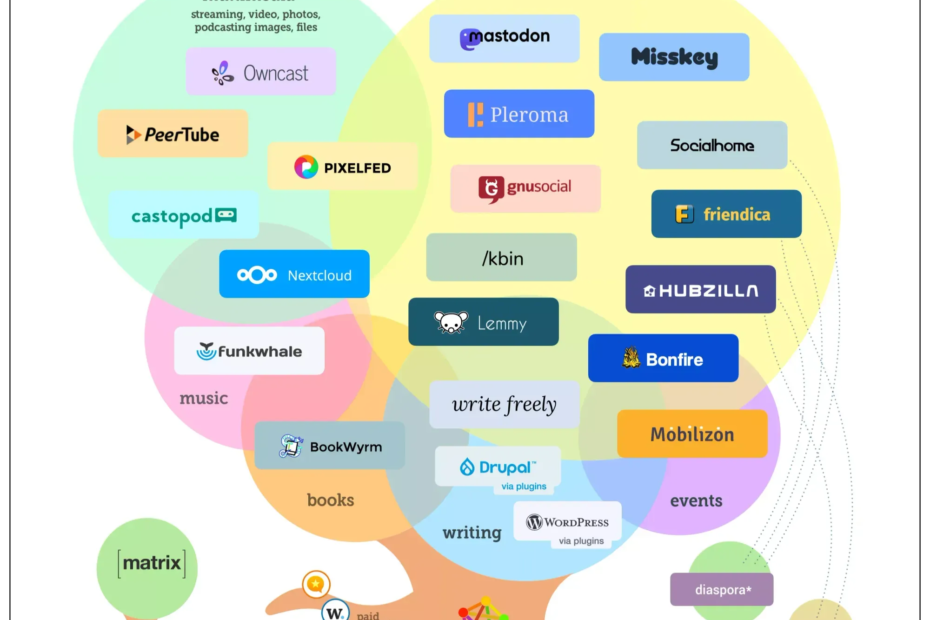It was 2017 when I signed up for the Dutch instance of Mastodon. The newfangled thing. But it wasn’t until last week that it *clicked*.
It clicked for two reasons.
Forget the Metaverse
Mastodon is part of the fediverse. Meaning it shares the core principles of the fediverse. With a little bit of reading, I got a better understanding of what the fediverse actually is, and how Mastodon fits in.
The idea is as old as it is clever. And it really is clever.
Technically the fediverse “is a collection of community-owned, ad-free, decentralised, and privacy-centric social networks“.
Let’s expand the explanation with an emphasis on what this means for a user:
The fediverse is a collection of community-owned, ad-free, decentralised, and privacy-centric social networks where a user can create a personal account on any specific instance but can connect to everyone else on every other instance.
Distributed instances is the key idea here.
The fediverse has many applications. There even is a reading sharing application (why didn’t I think of this?). But for now let’s focus on Mastodon. The fediverse microblog equivalent. Every user on any Mastodon instance can connect to any other user on any other Mastodon instance (mostly). And all these instances are run by different people.
Just like email
The best analogy might be email. You can roll your own email server, use your company’s email server, or Gmail or Outlook or what have you. But — and this is important — you can send and receive email to and from anyone with a valid email address.
Just like you can with a Mastodon address, powered not by SMTP but the ActivityPub protocol.
The idea is brilliantly simple, and it is how the internet is actually supposed to — and always used to — work and it has lots of upsides.
Upsides
Instances are run by individuals or groups who set their own rules. And thus every instance has a unique user experience or feel. There are many specific instances with distinct communities.
There is (theoretically) no real technical limit to the amount of users an instance can have*, but my guess is that most instances will top off somewhere to keep the instance manageable and moderation feasible. Just like most real life communities.
Because moderation is done per instance (implicitly by rules, explicitly by blocking users), this makes moderation distributed by default and thus scale-able. Did I mention it was clever?
*I would like to suggest Dunbar's number to the power of two: 22500 users per instance.

Open
Mastodon is open. In the realest sense. And I love the open web.
Everything on Mastodon is open and uses RSS: accounts, hashtags and more all are expressed as RSS feeds. I just love love love that part.
The openness comes with great upsides:
There is no ad-driven algorithm.
Don’t like the moderation rules on your instance? You can move your account to another instance.
Want to see the source code? Here you go.
Want to run your own instance? You do you!
Momentum
Apart from not really understanding the fediverse, the other reason it didn’t click in 2017 is because no one I knew was there. Kind of important for a social media platform. But this classic chicken-egg problem got a gigantic kickstart with the recent influx as a result of the exodus from that.other.site. And Mastodon finally seems to have hit critical mass: there are enough people to make it interesting, thus attracting even more people. It really has come alive in the last few short weeks.
There are lots of curious people checking out the new thing, of course time will tell how many will stick around. And compared to other social media sites, the numbers are still really small, but gaining!
However I would think the end goal of Mastodon should (and is) not necessarily a question of replacing Twitter. Both will most likely co-exist — 44 billion dollar usually doesn’t evaporate just like that. But having Mastodon makes the world that much better, and it gives the users a choice.
I don’t think it is necessarily that people are fed up with new Twitter leadership (it’s only been a week, right?), but I do believe people are fed up with the Twitter experience in general drawing them to — finally viable — alternatives likes Mastodon.
And most of these experiences are things that Mastodon implicitly or explicitly addresses. Things like: moderation, accountability, community, ownership and resiliency.
But I also notice lots of Twitter people — mostly with large followings — are hesitant. I follow quite a few US tech people, and most seem bullish on Musk. Few are not. We’ll see.
But apart from that there are other challenges.
Challenges
Let’s name a few.
- Usability: Signing on, using Mastodon, understanding the Mastodon/Fediverse idea, finding and adding accounts. It’s not entirely intuitive, and thus a barrier.
- Performance: call it growth spurts. But most Mastodon instances are suffering greatly at the moment, hindering the user experience.
- Security: the openness also brings challenges!
- Twitter: IF (big if) Twitter somehow is able to address some of their issues this would provide a big pull force.
This all being said the main challenge at this time seems to be:
- Discoverability: where is everyone, where are interesting accounts, where are the people I know?
Mastodon needs to do better than sharing spreadsheets for finding interesting accounts. But I do understand that this is the paradox of the open web. Having open, distributed content hinders discoveribilty (also see: podcasts).
Either way, the distributed character of Mastodon makes it here to stay. The only way is up for the foreseeable future. It’s pretty great to finally have an open, distributed real application, that is not blockchain.
Eugene Rochko
I would like to point out something. Mastodon is the project of one person. Started in 2016. Sure lots of people hatched on since, but to me it is indicative.
Most revolutions start with one person. They might not be the first or their idea might not be original. But timing, the right decisions and right personality are usually what tip the scales in these types of events. Also see: Linus Torvalds.
It seems Eugene is a true Mensch. Working many hours a week providing great software for a moderate salary (people working on Google ads make 20 times that).
A person with his talent could easily work somewhere else and make more money. But it is obvious he is not in it for the money.
And it is obvious he has thought longer and more about certain things than most people.
If you allow the most intolerant voices to be as loud as they want to, you’re going to shut down voices of different opinions as well. So allowing free speech by just allowing all speech is not actually leading to free speech, it just leads to a cesspit of hate.
Eugen Rochko in Time
It’s not just the software that makes the difference. It’s the people making the software that do.




